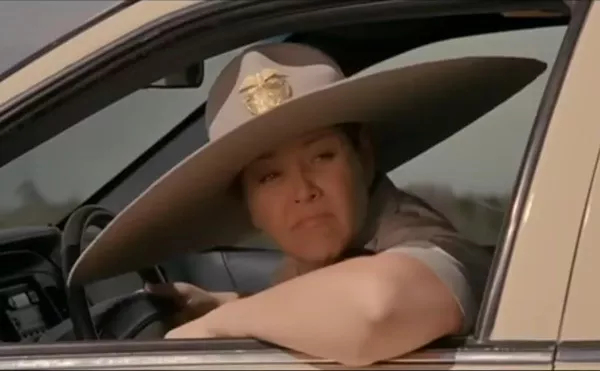Maybe it would be amusing to start with Gaiman's description of himself as "the wussiest of wussies," which sounds even funnier when heard spoken in that burnished English accent of his, toned down only slightly by eight years of living in Minnesota with his American wife and their children. Likely, Gaiman's legion of fans--a rabid cult of True Believers spawned by Dream and Death and Desire and their Endless brood in the pages of Sandman, a 75-issue illustrated epic that long ago transcended the comics genre--would not think of him as a wussy. Gaiman is, in fact, among the most daring of writers around--audacious, almost to the point of arrogance. Who else would take it upon himself to rewrite our myths, rescue our gods, and refine and defile history to the point of recreating the entire universe in his own black-clad, pale-faced image?
Who else would rewrite Snow White and give it an unhappy ending, show us a hack named Shakespeare willing to make a Faustian deal just for a modicum of talent, or write a children's book about a boy who trades his dad for two goldfish? Who else would take us to a serial killers' convention in Georgia where the honored guest is a demon dream who eats young boys' eyeballs? And who would spend 2,000 pages writing about gods and myths and dreams in a comic-book format, only to walk away from it at the peak of popularity to pursue his ambitions of writing fantastic novels about unfathomable worlds just beneath our feet and gods abandoned by immigrants when they land on the shores of America?
Surely, not a wussy.
"I am a major wuss until I get interested in something or need it for a story," Gaiman insists. "Everything that goes on in the human body is likely to send me a gentle green color, until I need to have a character going to an autopsy and eating little bits of the body while he's cutting off other bits to pickle in alcohol for the autopsy. I run it by my local doctor, who's also the county medical examiner. I'll ask him if something's right, and he'll say, 'No, don't forget the kidney.' Enthusiasm will carry me over anything. Interest overrides everything, as does the desire to tell people cool little things. If I wasn't a writer, I would be really boring. I would be Cliff Clavin on Cheers, saying, 'Did you know...?' all the time. And people would hate me."
But, of course, they do not: Neil Gaiman is literature's rock star, as evidenced by the throngs of Ankh-wearing Goth gals and leather-bound fanboys who line up to meet and greet him at comic cons or fantasy fairs when he makes a rare appearance. They are, he says, mostly in their 20s, which makes the 39-year-old Gaiman feel particularly ancient at times, especially when they tell him of how they read Sandman when they were in their teens during the late 1980s and early '90s. But their adoration is greatly appreciated. After all, it allowed him fame and freedom enough to leave behind comics for the charts of best sellers, where his 1997 novel Neverwhere, about dark fairy-tale world lurking beneath the London subway system, sat for a moment.
Right now, Neil Gaiman has better things to do than talk to a journalist, an occupation he held until his editor told him to write a story about how Dungeons & Dragons was turning the youth of Britain into suicides and Satanists. He turned down the job, figuring if he were going to make up stories, he'd make up his own. Gaiman initially agreed to this interview to talk about DC Comics' forthcoming paperback release of Sandman: The Dream Hunters, a lushly illustrated novel resurrecting his most famous creation in a tale about a Japanese monk and the fox-female who loves him. The book was done for Sandman's 10th anniversary and in collaboration with Japanese painter Yoshitaka Amano, and Gaiman is quick to point out that despite his own earlier explanations, it is not based on an old Japanese proverb. "I am such a liar," he says, chuckling slightly, "and I feel so guilty."
But he has more pressing concerns than discussing a year-old book. The author is late turning in his fourth novel, American Gods, which Amazon.com keeps insisting will be released in October--despite Gaiman's letters to the online bookseller protesting otherwise. American Gods has simply overtaken its creator: At 400 pages, it is not even halfway finished. The problem, Gaiman says, is that there's so much to say with American Gods, which encompasses 20,000 years of history and includes stories about slavery and America's tackiest, gaudiest roadside attractions. The initial story hasn't changed since he sat down to write it months ago. It's essentially about how the gods of centuries of immigrants have been abandoned and forced to take blue-collar jobs on the fringes of a magical but familiar America. The book is roomy enough to allow the author to run amok, and he can't seem to sit still.
"What you tend to have in your mind is a kind of a map when you begin: You know what kind of place it is, and you know where you're going," he says. "With American Gods, I feel like a kid from New Jersey who announced proudly that he was going to walk to California and see everybody in three or four weeks, and currently, I'm somewhere around Salt Lake City thinking, 'How the fuck did I get here? Why has it taken so long? And how the fuck do I get out of Salt Lake City?' When I went on my last book tour 18 months ago, I said there was no reason for anyone to write books the size of giant bricks. And I think the Gods of Authors heard me, and after the third or fourth time I said that, they said, 'Right, we'll get you next time.'"
Not long ago, a journalist asked Neil Gaiman how he feels about the fact that, despite his large body of work--novels, comics, children's books, short stories, and so forth--he will be remembered solely for Sandman. Gaiman sneers at the question, but it's not an entirely unfair one, and he knows it. After all, Sandman was a hit almost from the moment the first issue, Preludes & Nocturnes, reached the stands in December 1988. Even now, its bound collections--10 in all--continue to rank among the best sellers in DC Comics' adult-oriented Vertigo offshoot, of which Sandman was the charter member.
The series spawned gushing praise: Norman Mailer wrote that it was a "comic strip for intellectuals, and it's about time." Tori Amos, whose songs often reference Gaiman, treats The Endless--the family of timeless gods who personify such forces as Death, Destiny, Desire, and, of course, Dreams--as though they exist in this world. ("On bad days I talk to Death constantly," she wrote in the introduction to 1994's collection Death: The High Cost of Living.) The title won more awards than are given for comics; it was treated, in fact, like literature, as though it were too special to be included among the panels-and-balloons riffraff. In September, DC will publish the paperback version of The Sandman Companion, a nearly 300-page book that explains every panel; no comic book ever received such elucidation.
But Sandman takes up just a few lines on Gaiman's bibliography. It took up years of his life and made him a comic-book immortal, but there's so much other wonderful stuff there. There is, for instance, the 1990 novel Good Omens, which Gaiman co-wrote with Terry Pratchett during the early days of Sandman. It reads like the Book of Revelation as penned by Monty Python's Flying Circus, with its Four Bikers of the Apocalypse and Crowley, "an angel who did not so much fall as saunter vaguely downwards." In February of last year, he released his third novel, Stardust, a beguiling tale about a man in search of a star fallen to earth and the woman he wants to wear it. Gaiman likes to say it was his one book that appealed to both his diehard fans and women prone to reading bodice-rippers.
Then, there are the various comics and graphic novels Gaiman worked on with illustrator Dave McKean, who contributed the covers to Sandman: Violent Cases, in which ancient Mob crimes seep into a man's modern-day life; The Tragical Comedy or Comical Tragedy of Mr. Punch: A Romance, in which memories of a demonic puppet and a crazy grandfather infect the narrator; and Signal to Noise, about a filmmaker dying of cancer who makes one final film in his warping imagination. In 1990, Gaiman also scripted another comic-book mini-series, The Books of Magic, about a bespectacled young boy named Timothy Hunter who discovers, with the assistance of four mystery men, that he possesses great magic. Not a few critics have tried to goad Gaiman into condemning J.K. Rowling for basing Harry Potter on Timothy Hunter, but he refuses to bite. "We all borrow from the same cultural stew," he insists. "Sometimes you take out a radish and return a turnip."
In each of these illustrated takes, as in so much of Gaiman and McKean's collaborative efforts, it's often hard to tell where Real ends and Dream begins. Flashbacks morph into strange futures, and the past leaks into the present until the people in the stories drown in overwhelming memories. These characters find no respite even in their sleep; their imaginations are their real prisons. "The path of memory is neither straight nor safe," says the narrator of Mr. Punch, "and we travel down it at our own risk."
But there, sticking out like a nun in a brothel, is The Day I Swapped My Dad for Two Goldfish, a story about a kid who, fed up with a dad who buries his nose in the newspaper, decides he's worth no more than a friend's fishbowl. And he'd keep the fish, too, if only his mother didn't demand his father's immediate return. The book has since become a kind of classic, ranking high on Newsweek's list of the best books of 1997. And it's something of which Gaiman has become immensely fond and proud--so much so, he's working on a second kids' book about wolves that live in the walls of a family's house.
"It's likely that in 100 years' time, people will say, 'You mean, the guy who wrote that book about the kid who traded his dad for two goldfish wrote something else as well?'" Gaiman says, insisting Sandman will not be his legacy. "A.A. Milne was a successful novelist, a leading West End playwright, one of the major Punch essayists of the 1920s and '30s, but if you go to Amazon and type in his name, all you will get are 500 different editions of Winnie the Pooh. He's known for two books of children's short stories and two books of children's poems...and that's it. On the one hand, it's kind of sad, but on the other hand, it puts him way ahead of most of the playwrights and authors of the '20s and '30s. Posterity gives, and posterity takes away, and posterity is a very peculiar beast that calls the shots it wants to.
"If, in 100 years' time, I'm remembered for being the guy who wrote the story about the kid who swapped his dad for two goldfish, there are worse posterities to have. And I am very proud of it. I'm a lucky writer. I know too many writers, many of whom sell more books than I do, who consider themselves trapped. It's a very sad and solitary thing to be talking to a writer who says, 'I would love to write Book X or Project Y, but my publisher won't hear of it.' I am in this amazingly enviable position, because I write Neil Gaiman stories, and people know that you will get something entertaining, something you've not read before, and you will probably get something that isn't anything like the last thing. And if you don't like it, that's OK, because you'll probably like the one after that."
And there will be plenty "after that": Gaiman likes to talk not only about American Gods, but of several other forthcoming projects, all due to appear in the middle of next year. In addition to his "brick of a book" and The Wolves in the Walls, Gaiman also will publish Caroline, a horror story for older children he began in 1990. He also expects to begin filming the screen adaptation of Death: The High Cost of Living, which he's halfway through writing. (He will have nothing to do with the on-again-off-again film version of Sandman, which, Gaiman says, is once more alive at Warner Bros.)
He is busy but also very lucky: Gaiman always knew he wanted to be a writer, having spent his childhood buried in the confines of a library filled with leather-bound books written in the early part of the 20th century. When other children his age dreamed of becoming astronauts and firemen, he wanted to be C.S. Lewis and Michael Moorcock. For a while, he thought he would specialize in science fiction. He also used to dream of disappearing into an alternate universe with a copy of J.R.R. Tolkien's The Lord of the Rings, which wouldn't exist in this parallel existence. Gaiman would take credit for Tolkien's work; he would be celebrated as a visionary, without having done any of the heavy lifting.
But somewhere along the way, he was surprised to find he had little interest in creating imaginary lands, discovering instead that there was enough magic in this land. His stories were rooted in "the real world," even if his characters slipped in and out of dreams and dimensions; his gods actually existed.
It's not surprising to discover that Gaiman's favorite short story of his is "Chivalry," written in 1993 and contained in the 1998 collection Smoke and Mirrors. It's a wry and beguiling tale about Mrs. Whitaker, an old English woman who, while perusing a local thrift shop, casually stumbles across the Holy Grail. She takes it home and puts it on the mantel between an old photograph of her late husband and a small china basset hound. She would trade Christ's cup for nothing, even when Sir Galahad shows up at her door, requesting the Grail. They strike up an odd friendship. The knight takes to helping her with chores around the house; she makes him lemonade and cream cheese-and-cucumber sandwiches. To provide the punch line would ruin the magic of the story, which might one day be made into a movie. Just days ago, Miramax Films' co-founder Harvey Weinstein optioned "Chivalry."
"It's a gentle, funny, human story, and one gets to say a bunch of things about growing old and about the nature of time and about people which I couldn't say in any other story," Gaiman says. "I love that. That, to me, is the joy of things. I get to ask questions in using fantasy that I don't think I could ask if I was just writing romantic fiction. You get to ask some of the really big questions and some of the really cool questions. In American Gods, I get to talk about things most of my readers will have seen 100,000 times in ways that will make them look at them for the first time. That, I suppose for me, is the power of fiction. That is where the magic lives."












